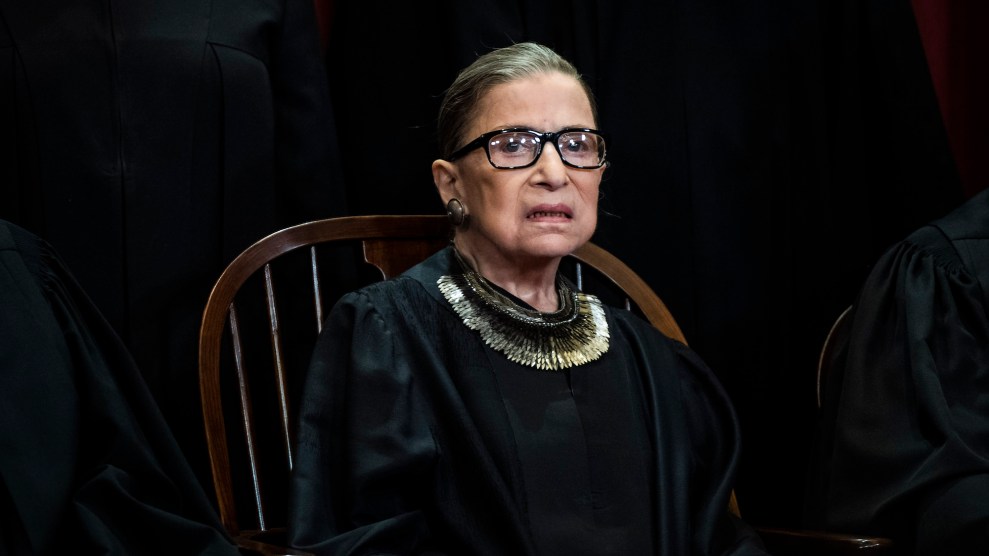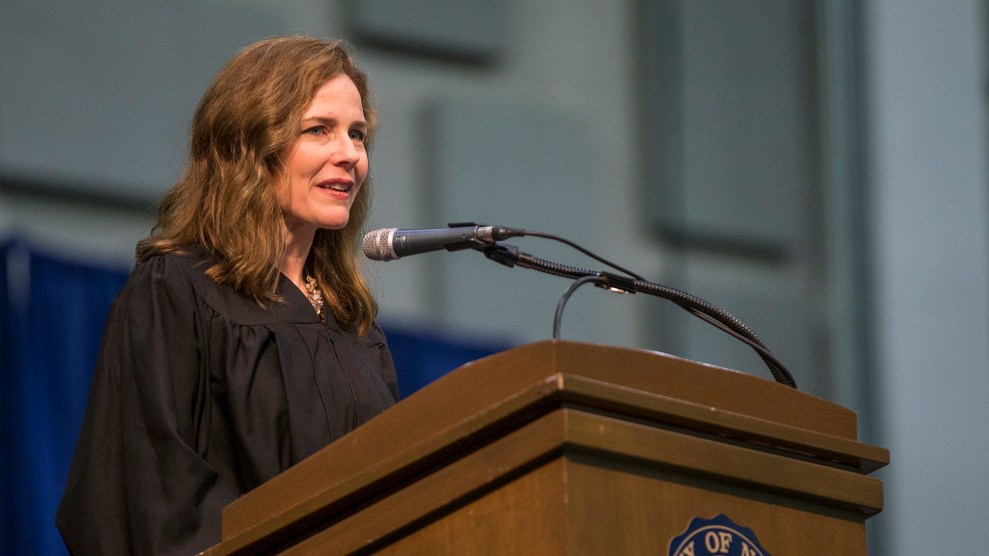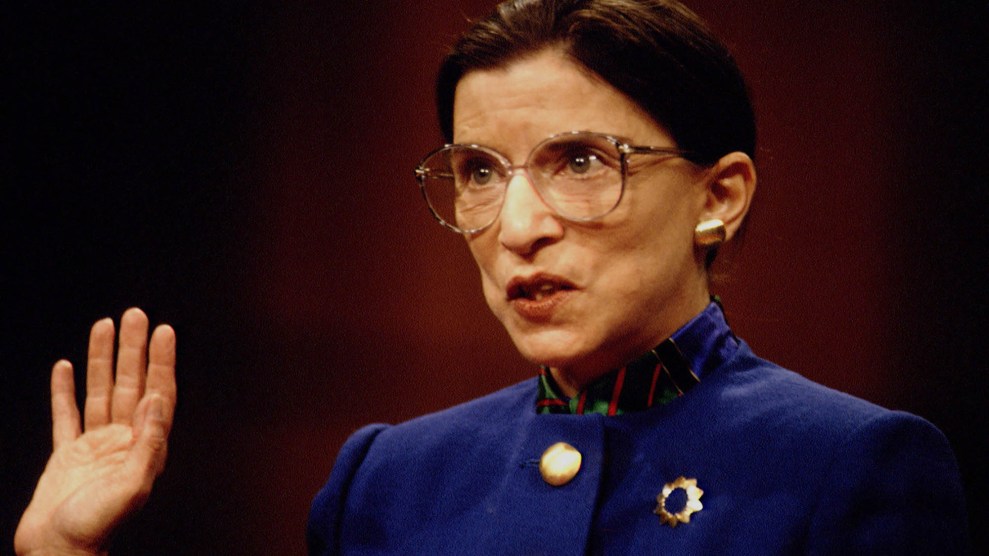
The Washington Post/Getty
Just a few months ago, 86-year-old Supreme Court Justice Ruth Bader Ginsburg was deftly smacking down oral arguments by supporters of a Louisiana abortion restriction, demonstrating the meticulous approach to the law and women’s rights that had earned her canonical status among feminists. Since her death last Friday, the existential threat to reproductive rights from an expanded conservative majority on the court has come into sharp relief. Yet while access to abortion is a cornerstone of gender equality—“central to a woman’s life, to her dignity,” as Ginsburg put it in her confirmation hearings in 1993—it’s far from the only issue where her absence will be felt.
The broader fight against discrimination based on sex, which defined Ginsburg’s career prior to her appointment to the federal bench, remains riddled with unsettled legal questions, some of which will come before the Supreme Court in short order. “A lot is on the line,” says Emily Martin, vice president for education and workplace justice at the National Women’s Law Center. “There are a lot of active fights about what does the law mean when it prohibits sex discrimination, and who has to follow that law.”
Legal experts and gender justice litigators say one of the most immediate fights is a religious freedom case scheduled to be heard by the Supreme Court the day after the presidential election. The case, Fulton v. City of Philadelphia, began in 2018, after a Catholic foster care agency told a newspaper reporter it would not certify same-sex couples to be foster parents. In response, the city of Philadelphia stopped referring foster children to the agency, Catholic Social Services, which in turn sued the city. The agency, along with some foster families, argues that it has a First Amendment right to be exempt from local laws and contractual requirements that it not discriminate against people based on their sexual orientation.
The outcome of the case could affect the ability of same-sex couples to become foster parents, and children to find foster homes, anywhere local governments contract with religious agencies for foster care services. But depending how the court rules, its effects could also be far broader—potentially weakening anti-discrimination laws across the country, says Diana Flynn, litigation director of Lambda Legal, an LGBTQ legal advocacy organization that has filed a brief supporting the city’s position. Catholic Social Services is asking the court to reconsider a 1990 decision, Employment Division v. Smith, that said an individual’s religious beliefs don’t exempt them from “generally applicable” state laws. If the court decides to overrule that precedent, it could become much easier for religious organizations to argue they should be exempt from anti-discrimination laws.
“Once these binders are off, I don’t think we could safely rule out any attack on various individuals that the administration and their allies have shown hostility to,” Flynn says. “LGBTQ people, certainly. But in other contexts, it could be women, it could be racial minorities.”
Ginsburg was considered “a very likely vote for enforcement of the civil rights laws at issue” in Fulton, Flynn says. Three years ago, when the Supreme Court ruled that a baker in Colorado was not obligated to make a wedding cake for a same-sex couple due to his religious beliefs, she was one of two justices who dissented. “Her voice of dissent has been so powerful because we need someone on the court to be able to tell the story of real people’s lives and what the decisions mean for real people,” says Ria Tabacco Mar, director of the ACLU’s Women’s Rights Project, which Ginsburg cofounded in 1972. In the Masterpiece Cakeshop case, Ginsburg “really understood that this is about being able to live your life as who you are—free from the fear that you’re going to be turned away because of who you are, free from the fear of being told your dollar isn’t good enough, free from being told, ‘Your kind is not welcome here,'” Tabacco Mar says. “She knew that fear all too well because, of course, that’s exactly what she experienced when she graduated from Columbia Law School and found she was unemployable.”
The Philadelphia foster care case being argued in November is “exactly the kind of case where, I think, Justice Ginsburg would see that of course it’s about nondiscrimination in an abstract sense,” Tabacco Mar adds. “But it’s also about being told, essentially, ‘We just think a child is better off with no parents at all than parents like you.'” (The ACLU is representing two other respondents in the case, Support Center for Child Advocates and Philadelphia Family Pride.)
Amy Coney Barrett, a judge on the Seventh Circuit Court of Appeals, is considered to be Trump’s top choice to take Ginsburg’s seat. Lambda Legal is opposing her prospective nomination, in part due to a letter she signed in 2015 affirming the Catholic Church’s teachings on the “significance of sexual difference and the complementarity of men and women” and that “marriage and family is founded on the indissoluble commitment of a man and a woman.” And her membership in the charismatic covenant community People of Praise, which emphasizes traditional gender roles in married relationships, opens up questions about how she views matters of sex equality.
Beyond Fulton, experts in gender and the law are looking ahead to brewing battles over Title IX, which bans sex discrimination in federally funded education. This summer, in the landmark ruling Bostock v. Clayton County, the Supreme Court ruled that employers could not fire someone for being gay or transgender under Title VII of the Civil Rights Act, which bans employment discrimination on the basis of sex, as well as race, color, religion, and national origin. Despite that ruling, the Trump administration claims that anti-trans discrimination in schools is allowed under Title IX—even threatening to withhold funding from Connecticut school districts that allow trans girls to compete in girls’ sports.
While lawsuits over trans student athletes play out in the lower courts, two cases involving the Title IX rights of transgender students to access school bathrooms that match their gender could soon be appealed up to the Supreme Court. Flynn, who represents one of the teenaged plaintiffs, Drew Adams, says that the court could consider that question in Adams’ case as soon as next fall.
More difficult to predict is whether the court will take up any of the high-profile legal questions around schools’ handling of sexual misconduct under Title IX. Four current federal lawsuits take aim against Education Secretary Betsy DeVos and her new Title IX regulations, which narrow the definition of sexual harassment and reduce schools’ responsibilities to respond to it. The cases include lawsuits brought by the ACLU, National Women’s Law Center, and 19 attorneys general. Meanwhile, student survivors of sexual assault and harassment have been suing their schools for not protecting them or mishandling their reports; at least one is petitioning the Supreme Court to hear her case.
Accused students have also filed hundreds of lawsuits of their own, claiming school sexual misconduct proceedings violated their right to due process and discriminated against them as men. It’s not clear how Ginsburg would have come down on these questions; in 2018, she told the Atlantic that it was valid to criticize some school codes for being unfair to accused students. “It is definitely more likely, with a large majority of conservatives on the Supreme Court, that if a case actually ever got to that level, it is unlikely to go in the favor of sexual harassment victims and unlikely to be more protective of sexual harassment victims’ rights,” says Nancy Chi Cantalupo, a professor at California Western School of Law. Barrett, for her part, gave a boost to these lawsuits last year when she authored an influential opinion allowing one case to go forward because it was “plausible” the school had been biased against the accused student as a man. “Barrett’s decision in that case raises concerns that on the Supreme Court she might seek to reshape Title IX so that schools could more easily be liable for holding harassers accountable than for failing to respond to sexual harassment,” says Martin of the National Women’s Law Center.
In the long term, Martin is concerned that legal fights over sexual harassment—what kind of behavior it includes, whether banning it violates freedom of speech, and whether addressing it is anti-male discrimination—could move from schools to workplaces. She’s also keeping an eye on a disagreement about equal pay in the federals appeals courts over whether employers can use women’s salary history as justification for paying them less than men.
“I am a little depressed,” Martin says with a laugh. But even with Ginsburg gone, she’s determined to continue the fight. “It is fair to say that her legacy is under threat,” she says. “I think it’s also important to note that a lot of her legacy is planting seeds for the future, even when she lost a particular battle. That legacy definitely continues, no matter what happens in this immediate fight—the belief that even if a battle is lost, that there is a broader arc of justice that we have the power to bend.”


















